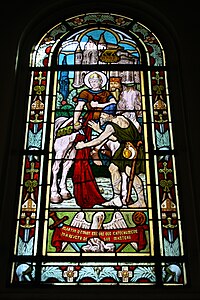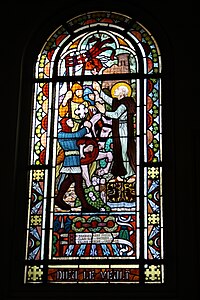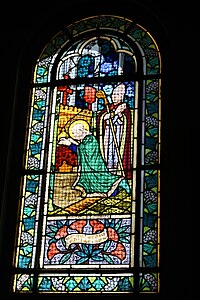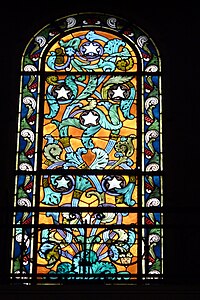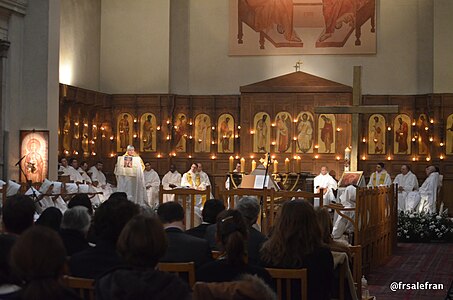Saint-Honoré d'Eylau
| Eglise Saint-Honoré-d'Eylau | |
|---|---|
 Saint-Honore d'Eylau New Church | |
| Religion | |
| Affiliation | Roman Catholic |
| District | Roman Catholic Archdiocese of Paris |
| Region | Île-de-France |
| Rite | Latin Rite |
| Status | k |
| Location | |
| Location | Paris, France |
| Architecture | |
| Completed | 1852 (old), 1896 (new) |
Saint-Honoré d'Eylau refers to two neighbouring Roman Catholic churches at 64 bis Avenue Raymond Poincare in the 16th arrondissement of Paris. The old church was built in 1852, the new church in 1896. The churches were once connected, and both report to the Archbishop of Paris, but their roles are now entirely different. The new church is the parish church, while the old church is now the chapel of a monastic order.[1]
The new church
[edit]The new church was built in 1896. The architect, Paul Merbeau, was greatly influenced by the Paris Exposition Universelle (1889), particularly the use of modern iron structures in Exposition buildings, which allowed greater strength and speed of construction. The supporting iron columns and arches in the church, resembling those of Gothic cathedrals, are painted white and present a dramatic scene. The iron arches and pillars are slender, opening up the view of the interior. The church has an abundance of Art Deco windows and decoration.[2]
-
Facade decoration
Interior
[edit]The interior has the elements of a classic Gothic church; the colonnades and the arched ceiling, but rendered with concrete and iron and brightly coloured. The dome is 26.5 meters high and 12 meters in diameter. The architecture of the dome was designed by George Gauidbert to include four windows on its lower level.[3]
-
The Nave
-
The Choir
-
Interior of the dome
-
side aisle
Art and decoration
[edit]The vault of the apse and choir is decorated with a large fresco entitled "The Resurrection" made by Maurice Rocher (1918-1995) and Paul Vigroux (1921-1985). Stained glass windows line both sides of the nave on both levels.
The Chapel of Sainte-Therese-de-Liseaux is in the Art Deco style, and features fresco murals by Alfred Sauvage (1892-1974) illustrating seven sacraments.
-
Chapel of Sainte Therese-de-Liseaux, with mural of the seven sacraments
Stained glass
[edit]The stained glass dates to the first half of the 20th century, and is especially colourful and abundant, with more than fifty windows, linking two levels on both sides of the nave. Most were was made by Louis Barillet and Félix Gaudin, working from illustrations by Raphael Freida.
-
'Saint Martin gives up his cloak"
-
"Saint Bernard of Clairvaux"
-
Portrayal of Henry II
-
A decorative window
The organ
[edit]The organ of the church was installed in the tribune in 1903. It was rebuilt in 1934 and 2001.
-
The grand organ in the tribune, illuminated
-
Organ -closer view
The old church
[edit]The old church is located on Place Victor Hugo at the intersection of Avenue Victor Hugo and rue Mesnil in the 16th arrondissement of Paris. It was originally built in 1852 as a parish church. Since 1974 it is the chapel of a monastic order, the Monastic Family of Bethlehem, of the Assumption of the Virgin and of Saint Bruno.[4]
-
The Old Church (1852) It is devoted to prayer and meditation.
-
Statue of Joan of Arc outside the church
-
Interior of the old church
-
A service by monks in the Old Church
History
[edit]On 2 September 1867 the funeral service of the poet Charles Baudelaire was held in the old church.
On May 13, 1871, during the Paris Commune, the church was closed and turned into a barracks for the Commune National Guard.
In 1974, the church became the chapel of a monastic order, the Monastic Family of Bethlehem, of the Assumption of the Virgin and of Saint Bruno. The monks, wearing white robes, devote their time to meditation and prayer.
Description
[edit]A statue of Joan of Arc is placed in front of the church. It is a replica of the marble statue of Joan that was made in marble for Marie d'Orleans that is now at the Chateau of Versailles.
Link to other sources
[edit]- [1] - Link to French Wikipedia article








